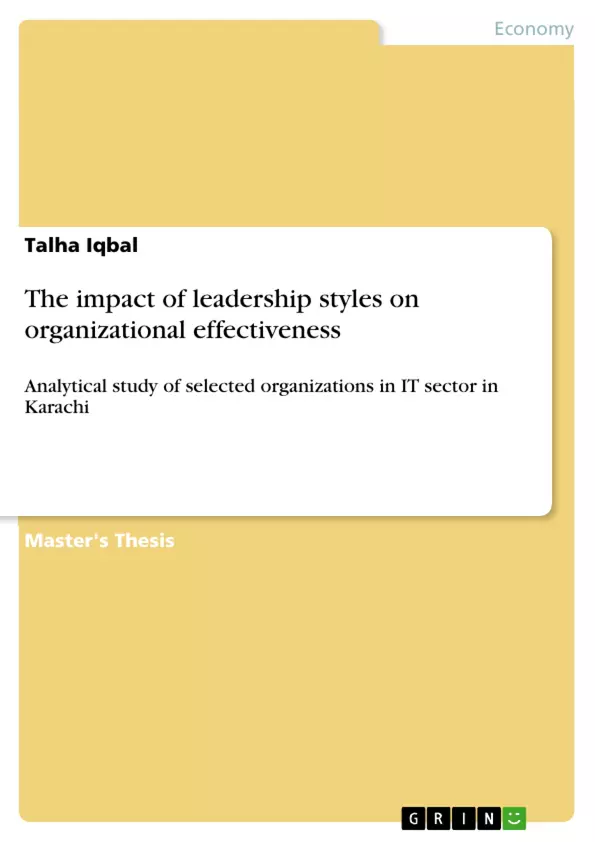The purpose of the dissertation is to analyze the relationship between leadership styles and organizational effectiveness of IT firms in Karachi. After the survey sent in the IT firm in Karachi it has been come into notice that leadership style affects the effectiveness of IT organization.
Four different types of leaders are found which are listed as dictator, democratic, visionary and free rein leader. All these styles have an impact on organizational effectiveness.
Dictator and visionary styles influence positively, whereas others negatively. The visionary or transformational style yield most organizational effectiveness. So this is the best style to be used.
The different dimensions used to define organizational effectiveness in IT industry are employee morale, organizations competitive position, customer satisfaction, management satisfaction, ability to introduce organizational change, market share of the firm.
It is better to use transformational leadership style in most cases but sometimes autocratic style can also be used. Autocratic leadership style should be used when the employee is young/fresh in the industry. They actually need direct guidance and concrete explanation about task.
Table of Contents
- Abstract
- Chapter 1: Introduction
- 1.1: Problem Statement
- 1.2: Research Objectives
- 1.3: Significance of the Study
- 1.4: Scope of the Study
- 1.5: Limitations of the Study
- 1.6: Delimitations of the Study
- 1.7: Definition of Key Terms
- Chapter 2: Literature Review
- 2.1: Leadership Theories
- 2.2: Leadership Styles
- 2.3: Organizational Effectiveness
- 2.4: Relationship between Leadership and Organizational Effectiveness
- Chapter 3: Research Methodology
- 3.1: Research Design
- 3.2: Population and Sample
- 3.3: Data Collection Method
- 3.4: Data Analysis Techniques
- Chapter 4: Data Analysis and Interpretation
- Chapter 5: Findings, Discussion, and Conclusion
- References
- Appendices
Objectives and Key Themes
This dissertation aims to examine the relationship between leadership styles and organizational effectiveness in the IT sector in Karachi. It seeks to identify the different leadership styles prevalent in the industry and evaluate their impact on key organizational effectiveness metrics. The study investigates the relationship between specific leadership styles and dimensions such as employee morale, competitive position, customer satisfaction, and organizational change.
- Leadership Styles in the IT Industry
- Organizational Effectiveness in the IT Sector
- Impact of Leadership Styles on Organizational Performance
- Correlation between Specific Leadership Styles and Effectiveness Metrics
- Best Practices for Leadership in the IT Industry
Chapter Summaries
- Chapter 1: This chapter introduces the research problem, outlining the motivation for the study and its significance. It details the research objectives, scope, limitations, delimitations, and defines key terms used throughout the dissertation.
- Chapter 2: This chapter presents a comprehensive literature review, exploring existing research on leadership theories, leadership styles, organizational effectiveness, and the relationship between leadership and organizational effectiveness.
- Chapter 3: This chapter focuses on the research methodology employed in the study. It describes the research design, population and sample selection, data collection methods, and data analysis techniques.
- Chapter 4: This chapter analyzes and interprets the collected data, presenting the findings of the research and drawing initial observations.
Keywords
Leadership styles, organizational effectiveness, IT sector, Karachi, Pakistan, employee morale, competitive position, customer satisfaction, organizational change, transformational leadership, autocratic leadership, visionary leadership, free-rein leadership.
- Quote paper
- Talha Iqbal (Author), 2011, The impact of leadership styles on organizational effectiveness, Munich, GRIN Verlag, https://www.grin.com/document/180421



